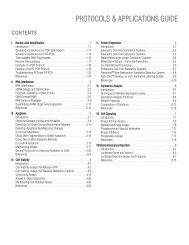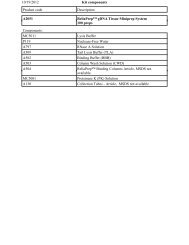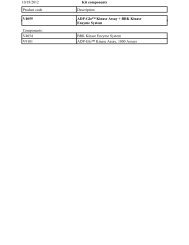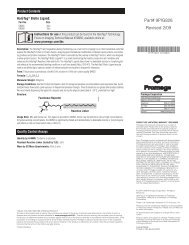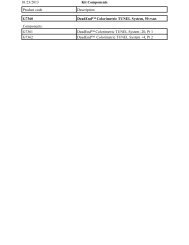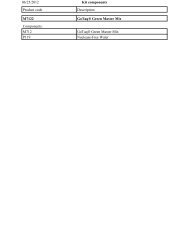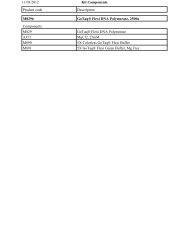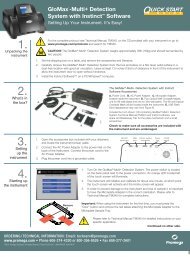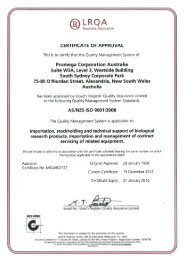2012 Promega catalogue
2012 Promega catalogue
2012 Promega catalogue
You also want an ePaper? Increase the reach of your titles
YUMPU automatically turns print PDFs into web optimized ePapers that Google loves.
Cell Signaling<br />
CellTiter 96 ® CellTiter 96 AQueous Non-Radioactive Cell<br />
Proliferation Assay (MTS)<br />
® AQueous Non-Radioactive Cell<br />
Proliferation Assay (MTS)<br />
Product Size Cat.# Price ($)<br />
CellTiter 96 ® AQueous Non-Radioactive Cell 1,000 assays G5421 394.00<br />
Proliferation Assay<br />
5,000 assays G5430 1124.00<br />
Available Separately<br />
50,000 assays G5440 Pls. Enq.<br />
CellTiter 96 ® Product Size Cat.# Price ($)<br />
CellTiter 96<br />
AQueous MTS Reagent Powder 1 g G1111 1364.00<br />
For Laboratory Use.<br />
250 mg G1112 424.00<br />
® AQueous Non-Radioactive Cell 1,000 assays G5421 394.00<br />
Proliferation Assay<br />
5,000 assays G5430 1124.00<br />
Available Separately<br />
50,000 assays G5440 Pls. Enq.<br />
CellTiter 96 ® AQueous MTS Reagent Powder 1 g G1111 1364.00<br />
For Laboratory Use.<br />
250 mg G1112 424.00<br />
Description: The CellTiter 96 ® AQueous Non-Radioactive Cell Proliferation<br />
Assay is a homogeneous, colorimetric method for determining the number<br />
of viable cells in proliferation, cytotoxicity or chemosensitivity assays. The<br />
CellTiter 96 ® AQueous Assay is composed of solutions of a novel tetrazolium<br />
compound [3-(4,5-dimethylthiazol-2-yl)-5-(3-carboxymethoxyphenyl)-2-(4sulfophenyl)-2H-tetrazolium,<br />
inner salt; MTS] and an electron coupling reagent<br />
(phenazine methosulfate) PMS. MTS is bioreduced by cells into a formazan<br />
product that is soluble in tissue culture medium. The absorbance of the<br />
formazan product at 490nm can be measured directly from 96-well assay<br />
plates without additional processing. The conversion of MTS into the aqueous<br />
soluble formazan product is accomplished by dehydrogenase enzymes found in<br />
metabolically active cells. The quantity of formazan product as measured by the<br />
amount of 490nm absorbance is directly proportional to the number of living<br />
cells in culture.<br />
If you currently use a [ 3H]-thymidine incorporation assay, addition of the<br />
combined MTS/PMS solution can be substituted for [ 3H]-thymidine at the time<br />
point in the assay when the pulse of radioactive thymidine is usually added.<br />
Data from proliferation bioassays comparing the CellTiter 96 ® AQueous Assay<br />
and [ 3H]-thymidine incorporation show similar results.<br />
CellTiter 96 ® AQueous MTS Reagent Powder is a novel tetrazolium<br />
compound for use in colorimetric assays for determining the number of viable<br />
cells in proliferation, cytotoxicity or chemosensitivity assays. It is provided in<br />
powdered form.<br />
Features:<br />
• Easy to Use: Combine provided MTS and PMS solutions, add to cells,<br />
incubate and read absorbance.<br />
• Fast: Perform assay in a 96-well plate with no washing or cell harvesting.<br />
Eliminate solubilization steps because the MTS formazan product is soluble<br />
in tissue culture medium.<br />
• Nonradioactive: Requires no scintillation cocktail or radioactive waste<br />
disposal (unlike [ 3 Description: The CellTiter 96<br />
H]-thymidine).<br />
• Flexible: Plates can be read and returned to incubator for further color<br />
development (unlike MTT).<br />
• Safe: Requires no volatile organic solvent to solubilize the formazan<br />
product (unlike MTT).<br />
® AQueous Non-Radioactive Cell Proliferation<br />
Assay is a homogeneous, colorimetric method for determining the number<br />
of viable cells in proliferation, cytotoxicity or chemosensitivity assays. The<br />
CellTiter 96 ® AQueous Assay is composed of solutions of a novel tetrazolium<br />
compound [3-(4,5-dimethylthiazol-2-yl)-5-(3-carboxymethoxyphenyl)-2-(4sulfophenyl)-2H-tetrazolium,<br />
inner salt; MTS] and an electron coupling reagent<br />
(phenazine methosulfate) PMS. MTS is bioreduced by cells into a formazan<br />
product that is soluble in tissue culture medium. The absorbance of the<br />
formazan product at 490nm can be measured directly from 96-well assay<br />
plates without additional processing. The conversion of MTS into the aqueous<br />
soluble formazan product is accomplished by dehydrogenase enzymes found in<br />
metabolically active cells. The quantity of formazan product as measured by the<br />
amount of 490nm absorbance is directly proportional to the number of living<br />
cells in culture.<br />
If you currently use a [ 3H]-thymidine incorporation assay, addition of the<br />
combined MTS/PMS solution can be substituted for [ 3H]-thymidine at the time<br />
point in the assay when the pulse of radioactive thymidine is usually added.<br />
Data from proliferation bioassays comparing the CellTiter 96 ® AQueous Assay<br />
and [ 3H]-thymidine incorporation show similar results.<br />
CellTiter 96 ® AQueous MTS Reagent Powder is a novel tetrazolium<br />
compound for use in colorimetric assays for determining the number of viable<br />
cells in proliferation, cytotoxicity or chemosensitivity assays. It is provided in<br />
powdered form.<br />
Features:<br />
• Easy to Use: Combine provided MTS and PMS solutions, add to cells,<br />
incubate and read absorbance.<br />
• Fast: Perform assay in a 96-well plate with no washing or cell harvesting.<br />
Eliminate solubilization steps because the MTS formazan product is soluble<br />
in tissue culture medium.<br />
• Nonradioactive: Requires no scintillation cocktail or radioactive waste<br />
disposal (unlike [ 3H]-thymidine). • Flexible: Plates can be read and returned to incubator for further color<br />
development (unlike MTT).<br />
• Safe: Requires no volatile organic solvent to solubilize the formazan<br />
product (unlike MTT).<br />
Storage Conditions: For long-term storage, store MTS and PMS Solutions at<br />
–20°C, protected from from light.<br />
Protocol Part#<br />
CellTiter 96 ® Protocol Part#<br />
CellTiter 96 AQueous Non-Radioactive Cell Proliferation Assay<br />
Technical Bulletin<br />
TB169<br />
® AQueous Non-Radioactive Cell Proliferation Assay<br />
Technical Bulletin<br />
TB169<br />
For complete and up-to-date product information visit: www.promega.com/catalog<br />
CellTiter 96 ® CellTiter 96 Non-Radioactive Cell<br />
Proliferation Assay (MTT)<br />
® Non-Radioactive Cell<br />
Proliferation Assay (MTT)<br />
Product Size Cat.# Price ($)<br />
CellTiter 96 ® Product Size Cat.# Price ($)<br />
CellTiter 96 Non-Radioactive Cell<br />
1,000 assays G4000 371.00<br />
Proliferation Assay<br />
For Laboratory Use.<br />
5,000 assays G4100 1085.00<br />
® Non-Radioactive Cell<br />
1,000 assays G4000 371.00<br />
Proliferation Assay<br />
For Laboratory Use.<br />
5,000 assays G4100 1085.00<br />
Description: The CellTiter 96 ® Assay is a collection of qualified reagents that<br />
provide a convenient method of determining viable cell number. This assay is a<br />
modification of the MTT assay method described by Mosmann and incorporates<br />
several improvements to the method that address previous technical problems<br />
including: 1) serum protein precipitation caused by adding organic solvent; 2)<br />
interference by phenol red; 3) incomplete solubilization of the formazan crystals<br />
resulting in lower sensitivity; and 4) stability of the colored product.<br />
Perform the CellTiter 96 ® Assay by adding a premixed, optimized Dye Solution<br />
to culture wells of a 96-well plate, usually containing various concentrations<br />
of growth factor or test substance. During a 4-hour incubation, living cells<br />
convert the MTT tetrazolium component of the Dye Solution into a formazan<br />
product. If you currently use a [ 3H]-thymidine incorporation assay, the addition<br />
of Dye Solution can be substituted for the pulse of radioactive thymidine at the<br />
time point in the assay when the pulse of [ 3H]-thymidine is usually added. The<br />
Solubilization/Stop Solution is then added to the culture wells to solubilize the<br />
formazan product, and the absorbance at 570nm is recorded using a 96-well<br />
plate reader. Direct comparison between [ 3 Description: The CellTiter 96<br />
H]-thymidine incorporation and<br />
tetrazolium conversion have demonstrated less than a 5% difference between<br />
the two assays for determination of growth factor content of several samples.<br />
Features:<br />
• Gain Sensitivity: Detect as few as 1,000 cells/well with a 96-well plate<br />
reader. Greater sensitivity than the neutral red assay procedure.<br />
• Use a Variety of Cells: Assay mammalian, plant and yeast cells.<br />
• Non-Radioactive: Requires no scintillation cocktail or radioactive waste<br />
disposal.<br />
• Save Time: Perform the assay in a 96-well plate with no washing steps,<br />
no cell harvesting and no scintillation counting.<br />
• Adapt to Your Needs: Follow either a 4-hour or overnight protocol.<br />
• Convenient: Requires no weighing or mixing of dye components.<br />
® Assay is a collection of qualified reagents that<br />
provide a convenient method of determining viable cell number. This assay is a<br />
modification of the MTT assay method described by Mosmann and incorporates<br />
several improvements to the method that address previous technical problems<br />
including: 1) serum protein precipitation caused by adding organic solvent; 2)<br />
interference by phenol red; 3) incomplete solubilization of the formazan crystals<br />
resulting in lower sensitivity; and 4) stability of the colored product.<br />
Perform the CellTiter 96 ® Assay by adding a premixed, optimized Dye Solution<br />
to culture wells of a 96-well plate, usually containing various concentrations<br />
of growth factor or test substance. During a 4-hour incubation, living cells<br />
convert the MTT tetrazolium component of the Dye Solution into a formazan<br />
product. If you currently use a [ 3H]-thymidine incorporation assay, the addition<br />
of Dye Solution can be substituted for the pulse of radioactive thymidine at the<br />
time point in the assay when the pulse of [ 3H]-thymidine is usually added. The<br />
Solubilization/Stop Solution is then added to the culture wells to solubilize the<br />
formazan product, and the absorbance at 570nm is recorded using a 96-well<br />
plate reader. Direct comparison between [ 3H]-thymidine incorporation and<br />
tetrazolium conversion have demonstrated less than a 5% difference between<br />
the two assays for determination of growth factor content of several samples.<br />
Features:<br />
• Gain Sensitivity: Detect as few as 1,000 cells/well with a 96-well plate<br />
reader. Greater sensitivity than the neutral red assay procedure.<br />
• Use a Variety of Cells: Assay mammalian, plant and yeast cells.<br />
• Non-Radioactive: Requires no scintillation cocktail or radioactive waste<br />
disposal.<br />
• Save Time: Perform the assay in a 96-well plate with no washing steps,<br />
no cell harvesting and no scintillation counting.<br />
• Adapt to Your Needs: Follow either a 4-hour or overnight protocol.<br />
• Convenient: Requires no weighing or mixing of dye components.<br />
Storage Conditions: Store Dye Solution at –20°C and Solubilization/Stop<br />
Solution at room temperature.<br />
Protocol Part#<br />
CellTiter 96 ® Protocol Part#<br />
CellTiter 96 Non-Radioactive Cell Proliferation Assay Technical<br />
Bulletin<br />
TB112<br />
® Non-Radioactive Cell Proliferation Assay Technical<br />
Bulletin<br />
TB112<br />
37<br />
2<br />
Cell Health Assays<br />
Section<br />
Contents<br />
Table of<br />
Contents



